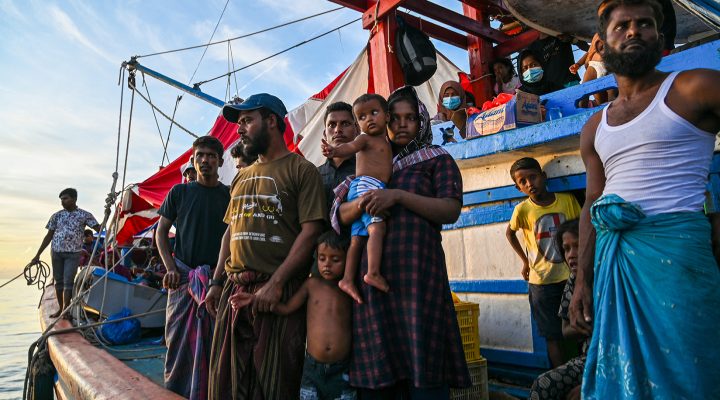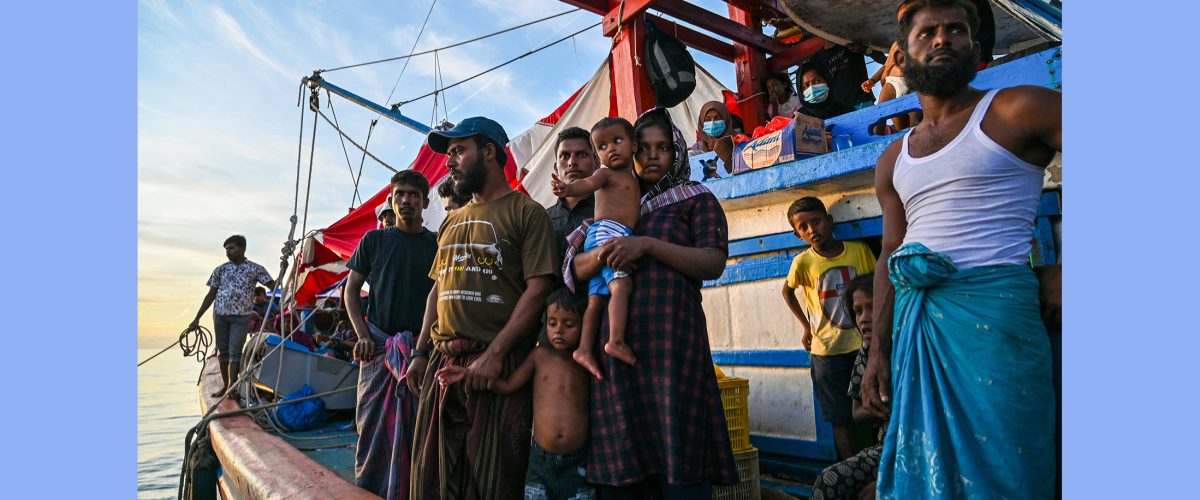Knox Thames wants Christians in America to care about people around the world facing genuine religious persecution — including those who are not Christians.
That’s a tall order, he says, because American Christians are so fixated on their own fights for religious liberty that pale in comparison to the death threats, torture and ruin facing 70% of the world’s population.
“The statistics from the Pew Research Center are really dark,” he explained in an interview with BNG. “About two out of three people on earth live in countries that restrict the free practice of faith. That doesn’t mean everyone’s being persecuted, but it means billions of people live in very restrictive environments. And if you try to change faith, question faith, leave faith altogether, you’ll be prosecuted by your government, persecuted by your neighbor or both.”
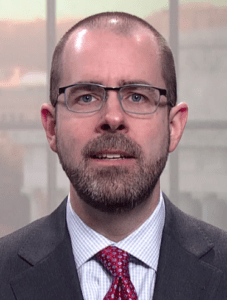
Knox Thames
Getting Americans to pay attention to global religious persecution is tough all the time but especially tough in an election year, he explained the day before leading an Oct. 24-25 conference at Dallas Baptist University on the topic.
“We’re having a conference that’s trying to think about how we inspire American Christians to care about anyone who’s facing religious persecution,” Thames said. “First, we need to do a better job of remembering our own. But also what I’ve seen time and time again over the years is when Christians are persecuted, almost always, their non-Christian neighbors are persecuted too. And we’re called to speak up for them and pray for them as much as we are for our own.”
A new book
His latest book, which also addresses the same topic, was published in September. Ending Persecution: Charting the Global Path to Religious Freedom is written for anyone interested in international affairs and religious freedom and how they intersect.
The book includes stories from Thames’ 20 years of government service — in the U.S. State Department, at the U.S. Commission on International Religious Freedom and across three presidential administrations — that illustrate dangers and solutions.
“It’s a practical examination of what persecution looks like overseas and what the United States and others who care about human rights can do to try to stop it,” he said.
Although the book is written from a nonsectarian perspective, Thames was raised a Baptist in Eastern Kentucky and remains active in a church in suburban D.C.
“Certainly my Christian faith is why I’m interested in this work, what motivates me to do this work, to advocate for freedom of conscience and belief for anyone everywhere,” he said. “But I’m not limited to Christians.”
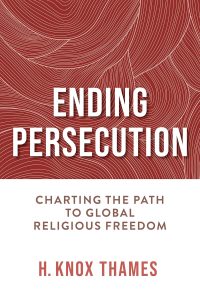 His previous book was a handbook on best practices to promote religious freedom internationally. That was sparked by his work inside government where he learned how Christians and others concerned about religious persecution should most effectively approach government officials for help.
His previous book was a handbook on best practices to promote religious freedom internationally. That was sparked by his work inside government where he learned how Christians and others concerned about religious persecution should most effectively approach government officials for help.
He encountered religious communities who had brothers and sisters being persecuted and sought to help them, “but they didn’t know how to interact with government officials in a way that was efficient and that would help me help them,” he said. “It was actually the Jehovah’s Witnesses who would come and talk about what was happening in the former Soviet Union and give me a two-page document with the who, what, when, where and why, and an action request. And that’s what I needed. So I was able to help them and also help others who were facing persecution. I wanted to share that knowledge that if you’re approaching a state department official, an office on Capitol Hill, they’re not going to read a 20-page report. They’re going to read the first paragraph.”
Be proud of America
Thames, who is a lawyer, began his work in Washington soon after Congress created the U.S. Commission on International Religious freedom through the International Religious Freedom Act of 1988.
In time, Thames served as policy director there for seven years. He also worked at the State Department and on Capitol Hill.
Based on that experience, he wants Americans to know they should be proud of the nation’s work on behalf of international religious liberty.
“As Americans, we should be incredibly proud of how much we do to advance religious freedom for other people in other countries. It’s a great reflection on who we are and our values that we really contribute so many resources toward this. No other country comes close. Other countries work with this in Europe and Canada, but we are by far and away the most generous, most committed country in advancing human rights and religious freedom.”
“Just because we’re good at it doesn’t mean we’re good enough.”
But even that is not enough, he warned. “Just because we’re good at it doesn’t mean we’re good enough.”
‘A pandemic of persecution’
In the book, he explains that a “pandemic of persecution” is “impacting every faith community somewhere.”
That pandemic includes four types or sources of persecution, he said. “There are different diseases, and different diseases need different medicines.”
The four types of religious persecution he cites are:
- Authoritarian persecution, such as experienced in China and Burma, the genocides against Uyghur Muslims, Rohingya Muslims.
- Extremist persecution, where mobs lynch people or burn down homes and churches as in Pakistan.
- Democratic persecution, such as evidenced in India and Nepal, where a religious majority uses the ballot box to transform their beliefs into law and then enforces it.
- Terrorism, such as that perpetuated by ISIS and the coercive religion of Iraq.
“The issues abroad are literally life and death. People’s lives are on the line.”
As horrible as all this is, it’s still hard to get Americans to care about it, Thames lamented.
“When I’ve worked on international religious freedom issues, we’re always in a way competing with the domestic religious liberty battles, which get millions of dollars of support and for dozens of amicus briefs filed. I’ve said, if we could get 10% of that attention to civil society groups doing international work, we could save lives.”
And this really is about saving lives, he declared. “The issues abroad are literally life and death. People’s lives are on the line.”

“The Good Samaritan,” Paula Modersohn-Becker, 1907.
Where to start
For Christians, the motivation must begin with the teachings of Jesus and the Parable of the Good Samaritan, Thames said. “The context is this lawyer trying to stump Jesus with a question, right? A gotcha question. And of course it’s a lawyer. The question, though, is what it takes to inherit eternal life. So it’s like the ultimate question and their answer is, ‘Love the Lord your God with your heart, soul, mind and strength and love your neighbor as yourself.’ And then the retort, well, who is my neighbor?”
What Jesus did with this parable, by making the hated Samaritan the hero, was the ancient equivalent of the plot twist in Star Wars, he said. “It’s like Darth Vader saying, ‘Luke, I’m your dad.’” It was shocking and scandalous.
For Christians, there should be no avoiding the Great Commandment to love neighbor as self, yet many Christians bypass it, Thames observed. “I’ve seen the way churches are these days, they’re either sort of Great Commandment churches or Great Commission churches.”
“If we’re ignoring people in their darkest hour because they’re not one of us, why would they ever listen to anything we have to say?”
But followers of Jesus are “not given that option to pick,” he said. “We’re given both commands, both of those charges.”
Advocating for religious freedom for all people is a “pre-evangelical” need, he said. “This is how you get everyone a chance to talk about ultimate questions, things we care about. If we’re ignoring people in their darkest hour because they’re not one of us, why would they ever listen to anything we have to say? And I couldn’t blame them. So if we want to share, we’ve got to care. And if they don’t join our community, that’s literally their God-given right of freedom of conscience and we’re still going to love them. They’re still going to be our neighbors, our friends.”
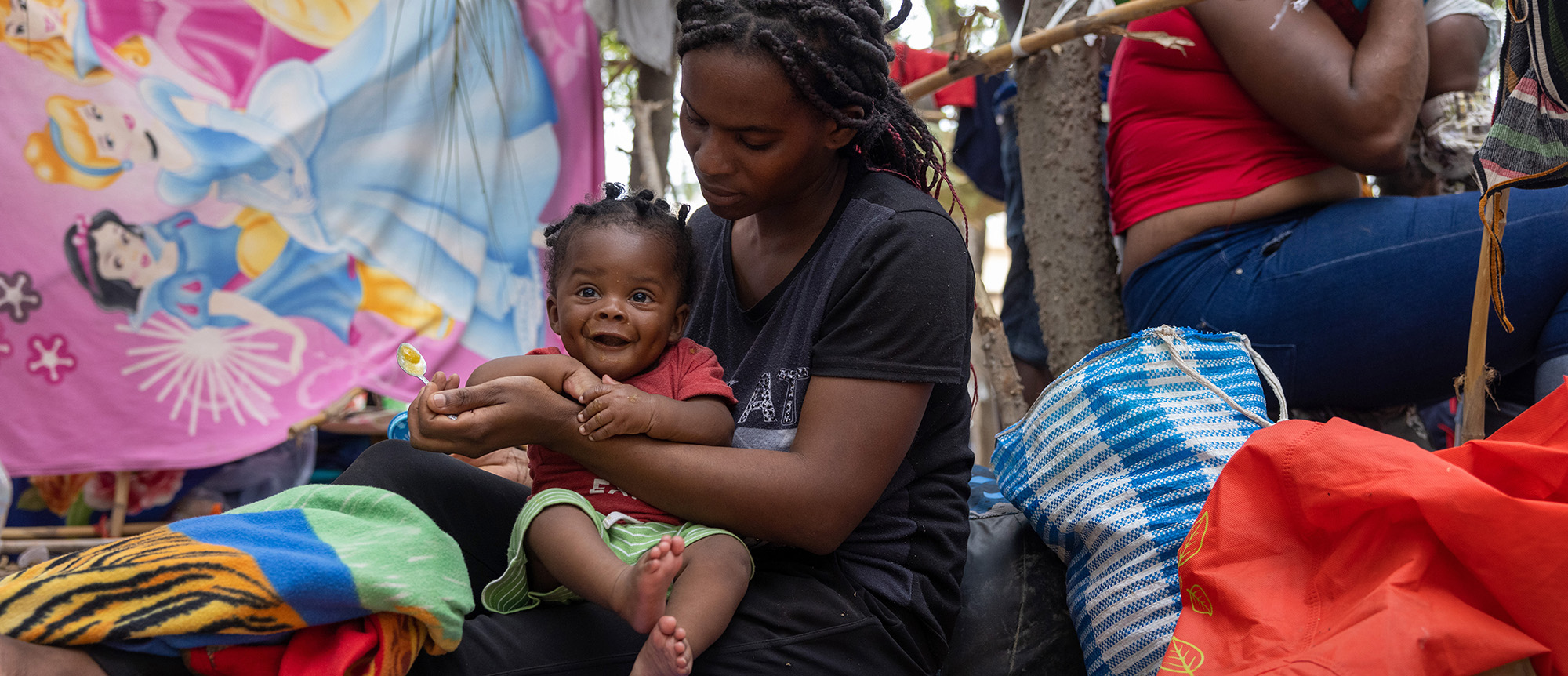
A Haitian immigrant feeds her child while staying at a large migrant camp at the U.S.-Mexico border on September 21, 2021, in Del Rio, Texas. Many of the estimated 14,000 immigrants in the camp located near the international bridge have been living in makeshift dwellings made of tree branches and carrizo cane. U.S. immigration authorities have begun deporting planeloads of migrants directly to Haiti while others have crossed the Rio Grande back to Mexico. (Photo by John Moore/Getty Images)
The immigration debate
Also, the rancorous debate about immigration in America has muddled the conversation about global religious persecution, Thames said.
The starting point, he said, is to understand “if we have an effective policy on religious freedom internationally, that’s going to preserve or recreate conditions where people don’t have to run for their lives. And that’s ultimately in their interest, that’s a good thing. But there’s also the reality that takes decades of work. This is a hard, hard thing to do to change these oppressive systems, to create an environment where people feel like they’re not at risk.”
In the meantime, “there are people who need sanctuary,” he added. “And this is where the United States has an important role to play, to be that sanctuary.”
Refugees are not dangerous, he explained. “These are the most deserving and the most vetted. I mean, there’s crazy people everywhere, but the refugee population is not those who we have to worry about generally about security issues.”
Refugees, he said, come to America ready to work and will take almost any job to get established. In his own experience working with refugees in Atlanta in the past, “employers loved them. They were doing these jobs Americans didn’t want, and they became great participants, taxpayers and ultimately citizens and great Americans.
“A welcoming posture to those who are running for their lives is in our interests.”
“And so it troubles me that this animosity toward the stranger is so pervasive. I mean, we need to have controlled migration. Open doors don’t work very well, but I think a welcoming posture to those who are running for their lives is in our interests.”
Know your neighbors
As for his advice to American pastors, churches and Christians, Thames said a first step is to get to know your neighbors. “There are people in your circles, I guarantee you, that you either work for, or work for you, or you work with, who either have experienced persecution themselves or have loved ones who have fled or are under threat. So just open your eyes to that in a prayerful way.”
After praying about how to respond to those around you, a next step is to begin advocating for them and their distant families, he said. “Because we are blessed to live in 21st-century America, in the most powerful country in the history of the earth, we can ask our congressmen and senators and presidential candidates if they care and let them know this is something we want them to focus on.”
Underneath all this is a need to understand the true definition of religious persecution, Thames said. “I am concerned that some folks here talk about persecution in America. Persecution is violent. It’s physical attacks, it’s jail, it’s torture, it’s rape, it’s murder, it’s biblical kinds of persecution. That’s not to say other things that happen in the U.S. aren’t bad. They could be discriminatory, they could be hateful, but we just need to be careful in our language because if we call everything persecution, then nothing is.
“And we’re selling out the folks who actually have their lives on the line. I pray for the day Pakistan is debating cake toppers — when I know people who have literally been dragged out of their homes and lynched and murdered because they’re Christian. That’s persecution.”
Where to find additional resources:
Christian Solidarity Worldwide
Stefanus Alliance International
21 Wilberforce
Open Doors International
Christians Against All Persecution

